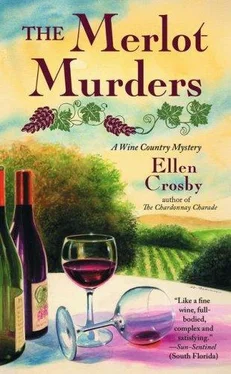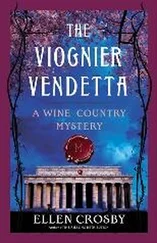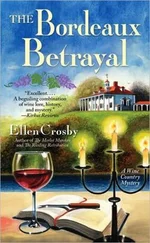“How many more acres were you thinking of planting?” I asked.
“Ultimately I was figuring on seventy-five. Fifteen thousand cases. I also think we don’t have to plant only French grapes.”
That would catapult us into the big leagues. It would also cost us a fortune. “You’re very ambitious.”
“We’d do it in stages.”
“We’ll have to.” It takes at least three years before a vine will yield fruit that can be used for making wine, real quality grapes, meaning there are three years of up-front costs before there’s a return on the investment.
Long ago my mother had cross-stitched a quote of Thomas Jefferson’s she liked that she’d framed and hung in her office. It read, “Wine being among the earliest luxuries in which we indulge ourselves, it is desirable it should be made here and we have every soil, aspect, and climate of the best wine countries.” Though Jefferson had tried for years to grow grapes at Monticello and encouraged a wine-making industry in Virginia, it had never happened during his lifetime. Now, sitting next to Quinn, I thought about the possibilities and promise of what could be, that here we did have the soil, aspect, and climate to plant vines that could yield world-class wines. Every reason to hope that we could do something extraordinary.
We had passed the last of the existing vineyards. I figured he was headed toward a series of old fields rimmed with more dry-stacked stone walls that checkerboarded the landscape. Beyond them, the terrain swept up to the highest point of our property. It was covered with trees and underbrush. If he wanted to use that hill, we’d have the additional expense of clearing it, but then slopes were the best place for siting vines.
He stopped by one of the stone walls and pointed to the hill. “Beginning over there,” he said. “It’s cooler and a different micro-climate from the rest of the vineyard so we could experiment. South-facing slope. Good drainage. It would be above any frost pockets and we’ll take out any impediments to cold-air drainage.”
I’d gotten out of the Gator when Quinn had been speaking and was about to head across the field.
“Umm.”
“Hey,” he said, “are you listening, or am I talking to the crows? Where are you going?”
I hadn’t been to this part of the farm for years, quite deliberately. The vegetation had changed the topography of the landscape, so at first I hadn’t been sure.
“Excuse me for a moment.”
After a few tries I found the small flat cross made of gray field-stones next to the wall. It was nearly buried by tall grass and weeds that I pulled away with my metal cane, using it like a scythe. I’d made the cross years ago to mark the place where my mother had fallen after Orion, her horse, had thrown her. I knelt and was pulling weeds when I heard Quinn’s footsteps behind me.
“I never saw that marker when I was here before.”
“You wouldn’t have. It was covered by brush.”
He grunted. “You bury a dog here or something?”
I finished clearing away debris around the stones and wiped the dirt off my hands on my jeans. I leaned on my cane and pulled myself up. “No.”
“What’s the cross for, Lucie?” he asked as we walked across the field to the Gator.
“My mother. Look, can we please get out of this heat?” I turned away from him.
“Sure,” he said gently. “Let’s go.”
When we got back to the Gator he said, “We don’t have to plant here.”
I shook my head. “She’d like it if we did.”
He chewed on a piece of wild chicory and said nothing.
“You know,” I continued, “my mother thought only the French could make good wine. I wonder what she’d make of you being the vintner here.”
He smiled that half-smile again. “Thomas Jefferson said every man has two countries. His own and France. I figure that makes me a little bit French. Besides, Jefferson’s good friend was Filippo Mazzei. A good paisano from Tuscany, just like my phantom father. Jefferson gave Mazzei two thousand acres near Monticello to grow vinifera in Virginia and produce some good Italian wine in the New World. So if an Italian vintner was good enough for Jefferson, it ought to be good enough for you. And your mother. Okay?”
I stared at him with my mouth open, as though he’d just spoken to me in perfect Attic Greek. “Well,” I said at last, “I guess so.”
“Good.”
We didn’t speak on the trip back to the winery. Quinn began humming relentlessly, something tuneless and off-key and loud enough to be heard over the puttering Gator. Like white noise, I tried to let it block my thoughts, but without much success.
Producing wine is as emotional a task as it is technical. To drink a glass of a wine you have helped create is to remember the weather that year, the events that happened in the world, and, inevitably, the events in your own life. As a result, I could never drink one of our wines from the year my mother died, for it seemed I always tasted a sadness that had seeped into the finish.
I wondered if it would be the same with wine from this harvest, the year of Leland’s death—whether Quinn would somehow unintentionally infuse it with a sense of loss or whether he could overcome that and instead we’d taste his hopes and the promise of the future as he produced his first vintage in Virginia. I didn’t say any of this to him, because I didn’t want to jinx things.
But after he dropped me off at the house no matter what I did the sterile anonymity of Section A46, Row 4 stayed with me. I thought about Quinn washing away all that blood and the hasty funeral my brother had organized.
Leland hadn’t been out there in the vineyard alone. Someone—someone I knew—had been there with him.
The house at noontime was worse than a blast furnace, and the heat so oppressive it weighed me down like the gravity on Jupiter. I took another shower and dressed without drying off. It helped for ten minutes and then I was as enervated and listless as I’d been before.
I’d been putting off making a trip to the attic, which would be even more suffocating and airless than the rest of the house, to retrieve one of the old fans, but it was getting down to choosing between the lesser of two evils. I rummaged in the kitchen for a flashlight, betting the lights would be burned out in the attic. When I found one, the batteries were dead so I pawed through more junky drawers looking for fresh replacements. After half an hour I quit looking.
I could buy batteries at the general store, which would be quicker than a trip to Middleburg. Besides, Thelma had already squeezed every bit of news about our family out of everyone else in Atoka, so there wasn’t much chance I’d get mugged for new gossip.
There was no one in the store when I walked in, even though three pickup trucks were out front, angled so they filled all the available pavement on either side of the gas pumps, the area Thelma liked to call “the parking lot.” The sleigh bells attached to the front door jingled as I entered. The store smelled, as it always did, of fresh-brewed coffee and pine-scented sawdust. Abruptly, voices in the back room stopped talking and a moment later, Thelma scooted out front. She was small and compact, a woman of “a certain age” as the French say, or, as she put it, “I’m not as young as I look.” She had the tornado energy of a twentysomething, but a lot of the old-timers said she was over seventy if she was a day. She was dressed completely in lime green from the bows in her bright orange hair to the killer pair of stiletto slingbacks. She wore the usual tonnage of makeup, though she’d gotten a bit whimsical drawing in her pencil-line eyebrows. I’d once heard her described as the Mata Hari of Atoka, with her va-va-voom style of dressing and her success at weaseling information out of her neighbors—but with the eyebrows she looked more like Spock from Star Trek .
Читать дальше












